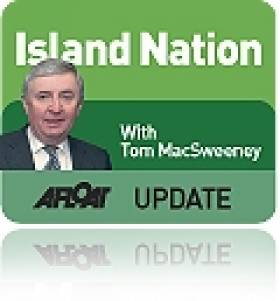Displaying items by tag: boat names
Superyacht Names, Marine Crying & Fog at Sea is Frightening
#islandnation – We were beating on port tack up past Cobh. It was a pleasant night's sailing in Thursday night's cruiser league race out of Monkstown Bay Sailing Club. Then the VHF came alive with the first radio call I have heard from the new Naval vessel, 'SAMUEL BECKETT' which had come up astern, returning from sea. The Naval voice courteously requested if 'ODD JOB,' the yacht on which I was crewing, would alter course, so that the State's ship could make her approach to the Naval Base at Haulbowline, off to our port side.
Our Skipper, John Hegarty, former Class Captain of MBSC Cruiser Fleet, acknowledged with equal courtesy and called a tack so 'ODD JOB' came about to go astern of 'L.E SAMUEL BECKETT' which could then swing across river, gliding into her berth at the Base.
We then brought 'ODD JOB' about again and returned to the racing fray. The alteration cost us first place on handicap by two minutes and forty seconds, but it was the courtesy of good seamanship and it set me to thinking again about the names which are attached to boats, remembering the controversy there had been about the naming of the 'SAMUEL BECKETT.'
I have written about the issue in the current, Summer edition, of Afloat, asking "What's In a Name?" also raising the issue of being called an "islander" and about which it is worth listening to the interview on the July edition of my radio programme, THIS ISLAND NATION on this website (Click HERE to listen), with the last man alive of the islanders who were evacuated from the Blaskets, Gearóid Cheaist Ó Catháin.
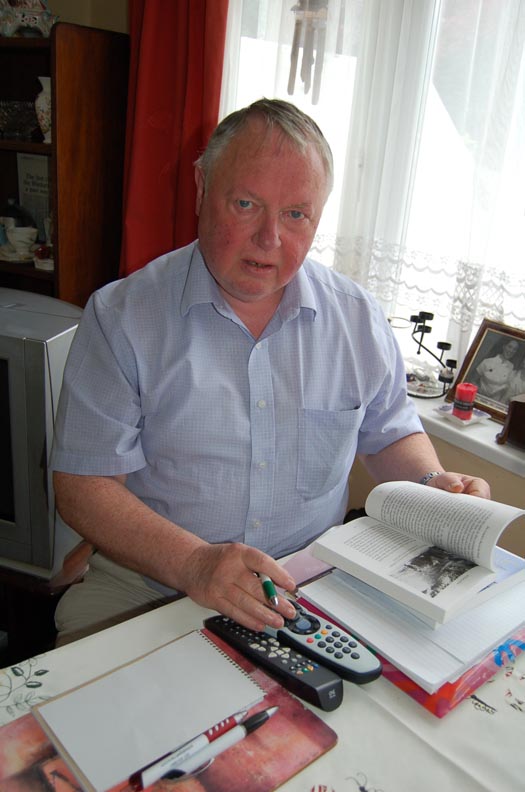
Gearoid Cheaist O Cathain - The Last Blasket Islander
The names attached to boats – and ships – are interesting when you study them.
Ships' names are changed so regularly these days that a vessel can have a string of them and former names can be seen, painted over, on the bow and stern of ships. The old adage that it was unlucky to change the name of vessels no longer seems to apply, though there are quite a few who still believe in this.
I don't, I have changed the name of every boat I owned and still own.
So, how are names chosen and what do they mean?
There is still a fair degree of annoyance in Naval circles about the name Samuel Beckett being applied to their new ship and that the next one is to be called 'L.E JAMES JOYCE.'
The belief, amongst those who have been in regular touch with me about the names, is that it was former Defence Minister, Alan Shatter, T.D., who insisted on these choices, against strong feelings in the Naval Service for continuance of the tradition of mostly naming vessels after figures from Celtic mythology.
In the United States the politically-appointed Secretary of the Navy has the right by law to name its warships. In the late 18th and early 19th centuries, the U.S. Navy had no formal procedure for naming ships. It wasn't until 1819 that Congress passed an act stating that "all of the ships, of the Navy of the United States, now building, or hereafter to be built, shall be named by the Secretary of the Navy." The Secretary has fulfilled this role ever since, even though the passage expressly assigning authority for designating ship names was omitted when the U.S. Code was revised in 1925.
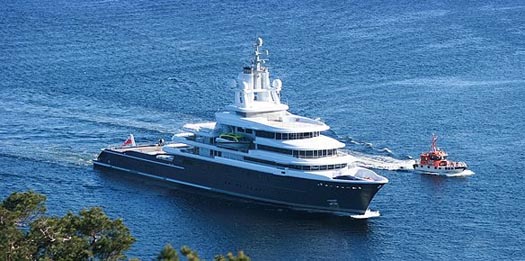
The Luna
The biggest superyacht registered under the British flag is now the 'LUNA,' built originally for the Russian billionaire, Roman Ambramovich, which was switched from Bermuda registration in a process handled by Watkins Superyachts, the London-based agency which is Luna's management and central charter agent. It is the world's largest charter expedition yacht in the world, 115 metres, built in 2010 by the German Lloyd Werft yard, at a cost of $185m.
Abramovich's 'other yacht' is named 'ECLIPSE,' which has its own advanced –missile system. Could that be to deal with Chelsea's misadventures?
The co-founder of Microsoft, Paul Allen, had his super yacht named 'OCTOPUS.' It has hatches at waterline level to form a dock for jet skis.
Amongst Richard Branson's stable was 'NECKER BELLE,' a catamaran for sailing around Necker Island which he owns in the Caribbean.
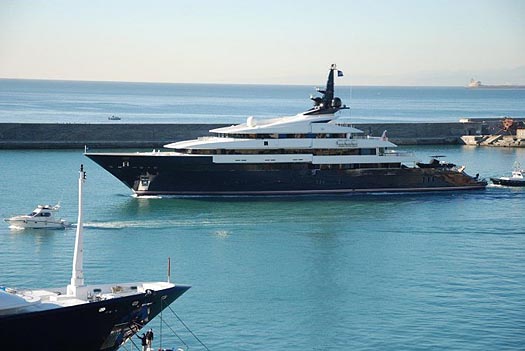
The Seven Seas
Steven Spielberg has 'SEVEN SEAS' which includes an indoor cinema.
Oracle boss Larry Ellison, whose funding of the winning of the Americas Cup dominated the sailing news last year, had 'RISING SUN' built, featuring an extensive wine cellar amongst other luxuries.' It is now owned by film producer, David Geffen.
And of course there were the Irish super yachts of Celtic Tiger times, such as 'THE ULYSSES,' once the subject of discussion in NAMA.
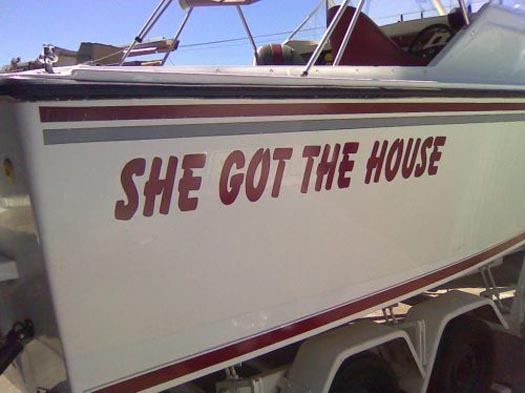
There are some clever names on boats – 'SHE GOT THE HOUSE' – now there must be a story behind that; 'CIRRHOSIS OF THE RIVER' and for those superyachts – 'WHO CARES.
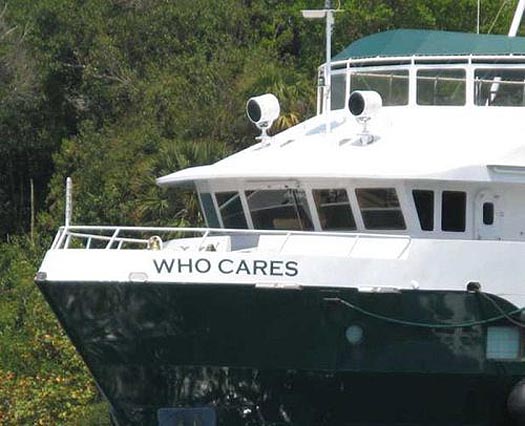
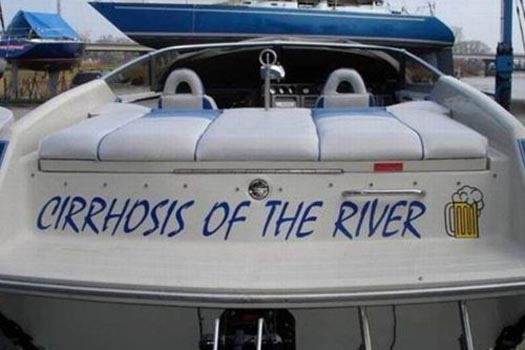
Then there are the regulars to be seen around marinas – 'AQUAHOLIC,' 'CAST AWAY,' 'DUN DREAMIN'; 'HAPPY HOURS'; 'SEA KNIGHT'; ' SEA MIST' 'Y KNOT' 'ALOAN AGAIN'; 'TOYSFORBOYS' 'DARK SECRET' and so on amongst them.....
So, what is in a name?
It should be indicative of confidence, I think, as well as of uniqueness and pride, without arrogance showing of course, unless that is you own a superyacht, when arrogance and naming seem to go together!
Fishing boats are often named by owners after their wives or children, or in a combination of both.
Owners of leisure craft vary widely in their choices, from the predictable to the somewhat bizarre and many shades between.
Commercial reasons can be used to name ships and change them to avoid legal difficulties.
But, does anyone notice what is in a name?
The public was not really energised by the Naval naming controversy.
The first boat I named was a 12 ft. Vagabond dinghy – 'LEGAN SCRIBE.' 'Legan' being traditional in the townland name of Monkstown so the local sailing club took pride in using it. This class of boats, unique at the time in Ireland, insisted that a name must indicate something about the owner. Being a reporter, mine was 'Scribe. The owner of a plumbing business had 'LEGAN LOO' and a butcher's boat was 'LEGAN LAMB'.
When I owned a Ruffian 23 I re-named it 'SCRIBBLER,' ignoring warnings about dangers inherent in changing the names of boats. I did similarly when moving onto a Sadler 25, which I re-named 'SEASCAPES,' as the purchaser of the Ruffian insisted on keeping its name - though a later owner changed it. I was then broadcasting a programme of that name. When I sold the Sadler, its new owner kept the name. So on the Sigma 33 which I now own, I changed its name to 'SEASCAPES II'. The purchaser of the Sadler later changed its name back to an original name it had.
'
While my new radio programme is named 'THIS ISLAND NATION' I won't be re-naming my Sigma. Not for the present anyway. I have thought about it, but the family who sail with me are firmly against it.
THE COAST GUARD CRIER
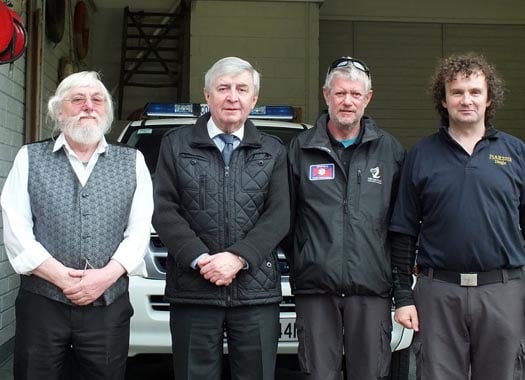
Cliff Winser, Afloat's Tom MacSweeney visiting Youghal Coast Guard station, Mike Lee, officer-in-charge and Tony Lawlor Coast Guard
What's in a name anyway?
For example, the name of Town Crier,' where a maritime man is to represent Ireland at the World Town Crier Tournament in Chester in England next month:
Youghal Coast Guard Station is located on the seafront, overlooking the harbour and Cliff Winser is an ardent believer in the importance of the service:
"There are two things I am particularly proud of in my life, being Receiving Officer for this station when it began operations and being Town Crier. I have been associated with the Coast Guard for a long time and have seen a lot of changes. This station was the first in the country to be completed and handed over to the service which was re-organised in the late 90s. The Coast Guard is not really sufficiently appreciated by the public, but then is any emergency service appreciated by the public until it is needed?" he told me.
"I have been Town Crier in Youghal since the 80s. It was historic and traditional to have a Town Crier and when it was being revived for a festival, I was chosen. Maybe it was my beard that got it for me! Anyway, it has been going since and the townspeople and tourists seem to like it and, with support from the town, I have been nominated for the world competition."
Cliff will be amongst 36 Town Criers from England, Wales, Germany, Holland, Australia, New Zealand, Canada, the Channel Islands and the USA, taking part:
"I'm doing a fair bit of practice at present. It all starts on August 15 and continues until a winner is chosen by the 25th, so it is a long tournament."
TIMELY RADAR WARNING
CHIRP Maritime is the Maritime Confidential Hazardous Incident Reporting Programme operated from the UK. It is a non-profit organisation which issues reports about safety-related issues or 'near misses' in all aspects of the maritime sphere. They published a 'FEEDBACK' newsletter which in its current edition has a detailed account of the close encounter which two yachts, travelling in company, had with a bulk carrier in fog in the English Channel. They were a 30ft. cutter and a 33ft.sloop. Even though they took what they thought to be avoiding action, the ship passed within a hundred yards, without seeing them. All three vessels, watching radar, in altering course to avoid each other, actually altered into the paths of each other at the same time.
The yacht crews were experienced, including an Ocean Yacht Master, an experienced professional Master Mariner and two Day Skippers. All concluded that fog at sea is frightening.
Top Ten Boat Names in America Make for Amusing Reading
#BOAT NAMES - The Boat Owners Association of the United States (BoatUS) has released its 22nd annual list of the top ten boat names in America, which makes for some amusing reading.
“A boat name reflects the life and loves of the owner,” says BoatUS's Occoless Trotter. “But it’s hard to sum it all up with just a few words.”
Word play seems to be the biggest attraction for new boat owners in the US. Number one for 2011 is 'Seas the Day', which has appeared in the list for the last number of years, followed by newcomer 'Nauti Boy'.
However, Tom Lochhaas at About.com Sailing says the results should be taken with a pinch of salt, as the list is based only on sales of BoatUS's own lettering kits, and does not distinguish between sailboat and powerboat names ('Aquaholic', anyone?).
He also suggests taking a day or two "to calm down before choosing a boat name, which may serve functions other than giving a chuckle to your fishing buddies when they see you at the dock."
The BoatUS Top Ten Names for 2011:
- Seas the Day
- Nauti Buoy
- Aquaholic
- Dream Weaver
- Pegasus
- Serenity Now
- Second Wind
- Liquid Asset
- Miss Behavin'
- Blew ByYou



























